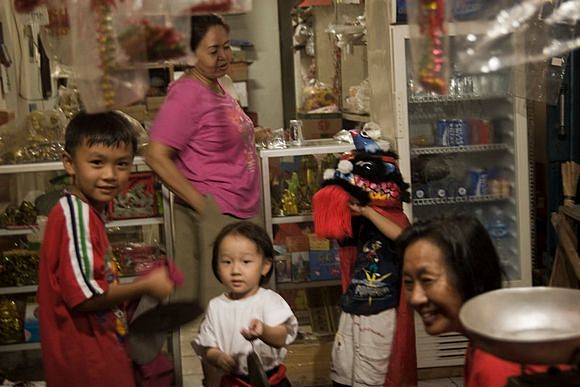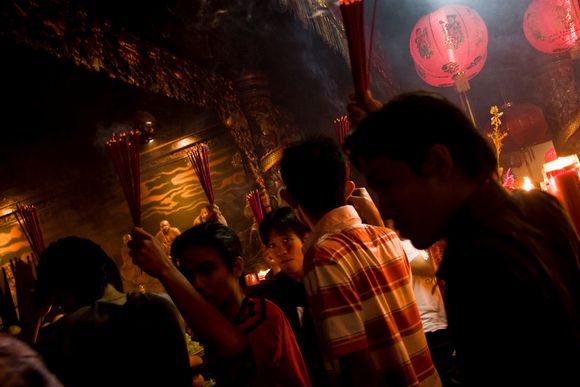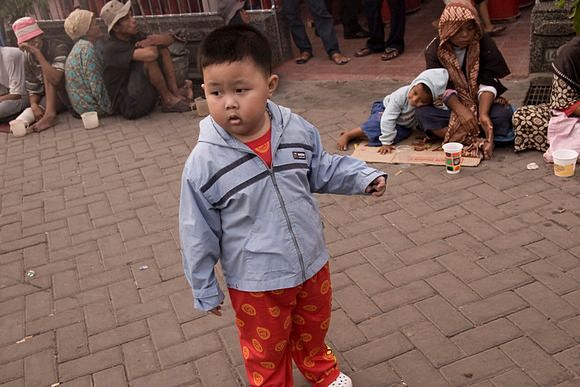Jemma Purdey
A social gap? Beggars gather outside the Bon Tek Bio Temple, Tangerang, West Java, Chinese New Year 2008Henri Ismail |
The situation of Indonesia’s ethnic Chinese minority is inextricably tied to the fate of their fellow Indonesians. Ten years after the fall of Suharto’s New Order government, improvements in their legal and social status mean Chinese Indonesians are free to express their ethnic identity in the spirit of the founding principle of Indonesian nationalism, Unity in Diversity. But although much has been achieved in this decade, challenges still remain. Two lingering concerns for ethnic Chinese are shared by many Indonesians ten years on: access to justice for victims of the New Order and the protection of the rights of religious and ethnic minorities. Unless there is a shift in current political and social trends in Indonesia indications are that these will remain sensitive and potentially unresolved issues for some time to come, keeping many ethnic Chinese, members of other minority groups and victims of the New Order on the nation’s margins.
Not so distant trauma
Before the fall of the New Order ushered in a period of reform, anti-Chinese sentiment and violence reached its highest levels in over thirty years. The 1997 Asian financial crisis triggered the collapse of Indonesia’s banking system and national currency, causing skyrocketing inflation and food prices. Amidst the chaos local consumers and national leaders alike looked for explanations and began pointing fingers. Rather than looking to inefficient and corrupt government agencies, regulatory bodies or global markets, local traders and shop-owners were blamed. The public and some local and national leaders turned against ethnic Chinese occupying these critical positions in the economy.
Food riots broke out spontaneously across the archipelago, but particularly on Java, targeting Chinese-owned businesses and suppliers. Widespread mob violence including burning, looting and attacks took place in Jakarta, Solo, Medan and Surabaya in mid-May 1998, following weeks of student demonstrations and clashes with security forces on campuses. In these cities the violence was more systematic and involved methods not seen in the earlier ‘riots’. Shopping malls were set alight and up to one thousand people were killed. Skilled ‘mobs’ attacked Chinese-owned stores and other property. However, it was the sexual assaults, including rapes, of one hundred and fifty women, most of them ethnic Chinese, which most shocked many Indonesians and the international community.
In May 2008 the Indonesian Commission for Violence Against Women (Komnas Perempuan) released a report to mark the tenth anniversary of the violence. It contains a detailed investigation of the situation of the victims ten years on and the responses of government and judicial agencies to calls for truth and justice. The authors of the report argue that national leaders largely ignored the sexual violence that occurred in the May 1998 riots, and find that ‘there is still controversy about whether or not the sexual violence took place’. The report also concludes that these female victims of sexual violence were selected on the basis of their ethnicity, and therefore that the assaults were indeed against the Chinese community as a whole. Most of the victims, if they could be located at all, have since chosen to hide their trauma and move on with their lives. But most still continue to feel unsafe. Some have relocated within Indonesia or overseas, or have even changed their identities. Despite findings in late 1998 from the fact-finding team that President Habibie established suggesting further investigation into possible involvement of military and intelligence agents, nobody has yet been punished for any of this violence.
The absence of justice for victims of May 1998 continues to cause disillusionment and an ongoing sense of vulnerability and mistrust in the authorities
The Komnas Perempuan report serves as a reminder that, as its authors put it, the nation as a whole has ‘a responsibility to ensure that the history of this nation is based on truth, not forgetting the May 1998 tragedy, and not forgetting the sexual violence which took place during the violence at that time’. Legal and human rights advocates, including Komnas Perempuan, the National Human Rights Commission (Komnas HAM), Commission for the Disappeared and Victims of Violence (Kontras) and the Institute for Policy Research and Advocacy (Elsam), working on behalf of victims of the New Order, continue to despair at the lack of political will to provide a genuine process for victims to seek truth and reconciliation, even ten years after reformasi. For many ethnic Chinese Indonesians this absence of justice for victims of May 1998 continues to cause disillusionment and to contribute to an ongoing sense of vulnerability and mistrust in the authorities.
Post-reformasi improvements
Notwithstanding these ongoing misgivings, the speed and extent to which the situation for the ethnic Chinese minority improved legally and politically in the wake of this violent transition is truly remarkable. For more than thirty years discriminatory policies and social conditioning had rendered Chinese outsiders. All of a sudden, the Chinese seemed to be welcomed into the Indonesian nation. The government repealed discriminatory legislation banning the practice of Chinese language and culture, lifting long-enforced taboos. This has had a profound effect on the way the minority has come to see itself as an ethnic group and as citizens of a multi-ethnic Indonesia.
Not long ago it would have been unimaginable that the military would incorporate a Chinese cultural display into its sacred nationalist rituals
For the first time in Indonesian history, presidents, ministers, governors and other senior officials regularly attend Chinese cultural events and watch traditional Chinese performances such as the such as barongsai (dragon dance). For example, the Indonesian Army’s 63rd anniversary was celebrated with a dragon dance performed by the Wirabuana Military Command, which oversees military affairs in South Sulawesi, at Karebosi Square in Makassar in October 2008. Not long ago it would have been unimaginable that the military would incorporate a Chinese cultural display into its sacred nationalist rituals.
 |
Chinese Indonesians celebrate Chinese New YearHenri Ismail |
Successive governments have also dismantled other legal restraints, including laws preventing non-‘indigenous’ Indonesians from becoming president. Former President Abdurrahman Wahid also acknowledged Confucianism as a religion. More recently the parliament passed a law which decrees that ethnic and racial discrimination is now punishable with a jail term. All these changes have had a great psychological impact on ethnic Chinese, particularly for the younger generation for whom this was previously an unexplored aspect of their identities. There has been a revival of Chinese (Mandarin) language study especially among young Chinese Indonesians and explorations of this identity in the arts and in popular culture.
Plurality threatened
With the exception of localised incidents during the period before Abdurrahman Wahid’s election as president in October 1999, there has been no significant anti-Chinese violence since May 1998. As many commentators have remarked, this is perhaps surprising given that in this time Indonesia has experienced some of the worst communal and radical Islamist violence in its modern history. The absence of extreme anti-Chinese violence like that seen in the late 1990s is indeed related to the great shift since then in state-led attitudes towards this minority and also the wide support for pluralism and multiculturalism in general. Ethnic Chinese make up less than two percent of Indonesia’s total population, scattered across the archipelago. Almost half live in Java, with significant singular concentrations in urban Jakarta and Medan.
Most Chinese Indonesians have double minority status, being also non-Muslim. Recent analysis of raw data collected in the 2000 census carried out by Aris Ananta and his team from the Institute of Southeast Asian Studies in Singapore found that 54 per cent of ethnic Chinese, Arabs and Indians declare themselves to be Buddhist, 35 percent Christian, 5 per cent Muslim and the rest Hindu and ‘other’. Most Chinese thus have a direct interest in the preservation and protection of religious pluralism, along with other members Indonesia’s Christian community (which in total makes up approximately 10 per cent of the population) and members of other smaller religious minorities.
Members of minority communities are worried about the government’s acquiescence to pressure from religious hard-liners, and the increasing popularity of conservative and intolerant views in the wider Muslim public. One of the best known challenges to religious pluralism in recent years concerned the Ahmadiyah Islamic sect. In June 2008, Religious Affairs Minister Maftuh Basyuni, Home Minister Mardiyanto, and Attorney General Hendarman Supanji signed a joint ministerial decree, calling on members of Ahmadiyah to return to mainstream Islamic practices. This decree followed many months of concerted attacks on Ahmadiyah members and their places of worship by radical Islamist heavies from the Front Pembela Islam (Islamic Defenders Front). This effective ban triggered international condemnation and widespread concern within Indonesia’s minority religions, and among progressive Muslims.
Many Chinese Indonesians remain uncomfortable with conspicuous displays of their religious practice, all too aware of the recent history of violence
The assaults on Ahmadiyah took place alongside attacks on Christian places of worship and schools. There have been many local conflicts over the use of buildings as places of worship in recent decades in Indonesia, particularly conflicts between Christian congregations and majority Muslim neighbourhoods, but these have been more frequent in recent years. For many ethnic Chinese Christians, these attacks call to mind similar violence in the final years of the New Order and in the period of transition under Habibie. During the late 1990s attacks on places of worship with largely Chinese congregations escalated in terms of frequency and the levels of violence used. The trigger for much of this violence was the ‘legality’ of the ‘church’. Complaints about extensions being added to buildings without appropriate official permission and excessive noise and traffic in the area on weekends were common. Attacks on what were churches with predominantly ethnic Chinese congregations, such as in Situbondo in mid-1996 and in Holis, a Bandung suburb, in October 1999 also involved attacks on ‘Chinese’ property aside from their place of worship.
Though attacks on churches in recent years have not spread in the same way to other ‘Chinese’ targets, their increased frequency in conjunction with the attacks on religious freedoms is a cause for concern for ethnic Chinese Christians and their co-religionists. Two years ago, the Minister for Religion and Minister for Home Affairs issued a joint decree that intended to clarify the rules and regulations governing the establishment of places of worship. Under this decree, congregations wishing to establish a place of worship are required to have at least 90 members, show that they have the support of 60 locals, and must acquire municipal permits and clearance from a newly established Community Forum for Religious Harmony. In the mid to long term the new regulations may improve the process for establishing new churches, mosques and temples. But the implications are less clear for buildings that are already being used for worship. Many minority groups operating places of worship in hostile Muslim neighborhoods find themselves in legal limbo and without protection as local communities are resorting to extra-legal methods of protest.
In stark contrast, indeed perhaps in defiance of this mood, evangelical Christianity, which is attracting growing numbers of Chinese Indonesians, is making bold new strides. In September 2008 the Indonesian Reformed Evangelical Church opened its ‘mega-church’, capable of seating 8000 people, in Kemayoran. The construction of the Messiah Cathedral was backed by money from Chinese Indonesian investors and led by the church founder Pastor Stephen Tong. A similar church led by Ambonese pastor Reverend Yacob Nahuway being built in Kelapa Gading will seat up to 10,000 worshippers. Whilst both have received permits, largely due to taking the precaution of building in commercial and Christian areas, others are proceeding without them.
Though it is too soon to judge how these ‘mega-churches’ will be accepted and what their role within inter-religious relations will be, sensitivities remain. In processing his permit Jakarta authorities had asked that Pastor Tong forego the cross on the steeple. The minister rejected this recommendation saying the cross was the most important symbol of a Christian church. In contrast to the boldness of these congregations in Jakarta, many Chinese Indonesians remain uncomfortable with conspicuous displays of their religious practice, all too aware of the recent history of violence.
Identity politics and minority representation
Many observers have praised the success of Indonesia’s shift to regional autonomy. Some have noted that Indonesian voters in local elections have almost invariably rejected candidates representing extremist or ethnically exclusive views. At the same time however, commentators from inside and outside Indonesia also note the rise in identity politics in the regions, including in the revival of adat (tradition or custom) and ethnically-based claims to leadership. Regional autonomy has encouraged and enabled reinvigoration of local ethnicities and cultures, most often elevating one dominant identity or culture over the other. At the level of regional and district government moves towards ‘moral legislation’ or ‘moral policing’ in the form of by-laws regulating dress and other behaviours has been prominent for some time, and arguably has the most impact on minority groups.
Most Chinese Indonesians remain disinclined to actively participate in politics and are unconvinced that there is a political role for ethnic Chinese as a group
Where does this type of politics leave Chinese Indonesians and their access to and share of political power? Most Chinese Indonesians remain disinclined to actively participate in politics and are unconvinced that there is a political role for ethnic Chinese as a group. However, experiences so far in several regions suggest that ethnic Chinese individuals may have as much chance as any other aspiring politicians. In recent years ethnic Chinese candidates running in local contests on issue-based tickets and backed by broad-based parties were elected district heads in East Belitung and Singkawang, where the deputy governor is also of ethnic Chinese descent. These examples are, however, rare and in the latter case involve a district with a quite large Chinese population relative to other ethnic groups. It may be that the implication of Chinese Indonesians’ unwillingness to participate in local politics will mean they will continue to rely on money politics to make their claims. As the experience under the New Order shows, however, in the long term such a strategy only increases vulnerability and disempowers the minority as a whole.
A way to go
 |
Offerings for a brighter future - Bon Tek Bio temple (anno1684) in Tangerang West Java 2008Henri Ismail |
The enormous improvement in the legal situation of ethnic Chinese Indonesians since 1998 has allowed them the freedom to express and explore their ethnicity and religious identities and to participate more fully in social and political life as Indonesian citizens. But while anti-Chinese sentiment per se may be declining, challenges to religious freedom and the rise of ethnic politics represent a new frontier for Indonesia’s Chinese community. The rise of the mega-church within sections of the evangelical Christian movement and including Chinese Indonesian followers may be taken as a sign of strength for Christians at a time of worrying challenges to pluralism. But as well-known intellectual and Jesuit theologian Frans Magnis Suseno observes, ‘Religious freedom is a fact, but it is also a fact that our state is a weak state and doesn’t dare to enforce the law if state people think that it is against the religious feelings of the majority.’
The ten years after the reformasi movement have opened opportunities for all citizens to challenge the ‘nationalist project’ in Indonesia. However, supporters of pluralism and many people in Indonesian human rights groups believe minority rights must continue to be strongly defended. The ‘multiple minority’ status of most ethnic Chinese and their limited role in regional politics dominated by identity politics, means they rely greatly on the national political and legal institutions to protect their rights as citizens. More than ever, then, it is the responsibility of Chinese Indonesians themselves, together with other minorities and human rights advocates, to actively defend pluralism and minority rights. ii
Jemma Purdey (jemma.purdey@adm.monash.edu.au) is a researcher in the Centre of Southeast Asian Studies at Monash University and a member of the Inside Indonesia board. She is the author of Anti-Chinese Violence in Indonesia, 1996-1999. NUS Publishing, Singapore, 2006.



